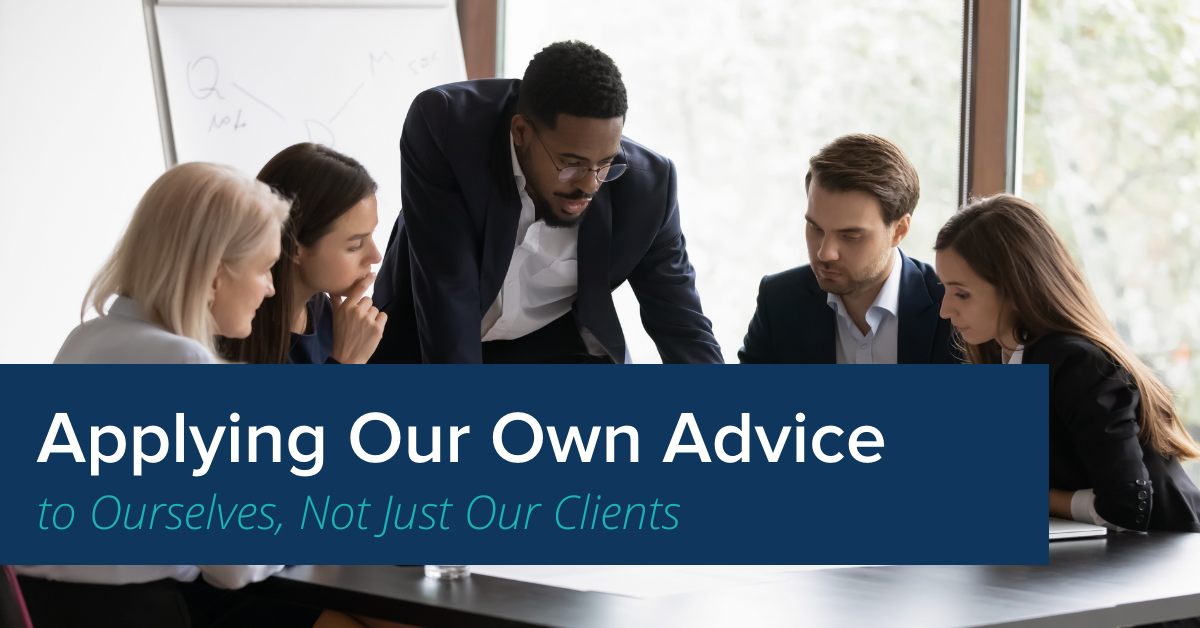Blog
Applying Our Own Advice to Ourselves, Not Just Our Clients

"Think about those future goals."
"Hold steady and don't react to the market."
"Remember, we have a plan and it's still well on track."
Throughout the market roller coaster of the Pandemic and now with 2022 rearing its head, advisors are getting used to coaching clients through market volatility. What matters most in these scenarios are two things: first, a trusted relationship between advisor and client, and second, preparation and education to navigate these emerging challenges.
The truth is many of the behavioral skills and coaching advice that advisors have honed over the years are also quite applicable to ourselves and how we run our own businesses. For example, planning and preparation for your client's financial future includes protecting and monitoring their most valuable assets. Would you count your financial practice as one of your own most valuable assets? Of course you do!
Review/Update Your Continuity Plan Annually
Just as you care for your clients by ensuring there are proper executors, insurance protections and estate paperwork in place for emergencies, how have you applied this same due diligence to your firm's continuity plan?
When clients put off important steps like collecting information or signing papers, or delay difficult family discussions, what then? We know every moment counts because the unexpected is always lurking right beyond the void. Not having the right documentation or right continuity or succession partner can be devastating when crises occur. If it's been more than 2 years since you reviewed your continuity paperwork or discussed the plan with your identified partner, it's time to revisit it. A lot can change in 24 months, including someone's willingness, capacity or financial ability to absorb your practice.
Don't Let Markets Pressure You Into a Quick Sale
Just as a market upswing can create confident, overzealous investors, the spicy 2020-2022 M&A market can make any advisor rethink their long term strategy. If multiples are really this high, maybe it is time to sell? Not necessarily. Price always feels like the most important factor at face value, but having gone through this with hundreds of advisors (maybe even thousands of firms on both sides of the table now) it is never just about the price. It's about the price that feels right to you, but once you settle on that price, it then becomes about everything else. It's never just the price. So before you throw out your long-term plans for growing and evolving your practice, give this one a good examination before deciding to sell simply because market rates seem appealing.
Market pressure makes clients do silly things. It also makes even the smartest advisors question their business strategies. It's good to pressure test and evolve as the landscape changes. We strongly encourage educational adjustments to succession and transition plans as a result of real-life shifts! 'Adjustments' being the key word... because when the market rallies, pressure settles in. But when you've built your business with intention, you are less likely to be distracted from those loftier, long-term goals. We recommend always knowing the value of your firm (with an annual Certified Valuation), remodeling scenarios to chart progress, understanding your benchmarks and key performance indicators, and ensuring that you're fortifying the value of your firm to the best of your ability. Of course services like FP Transitions' EMS™ Professional is built for advisors in this growth mindset. The program offers all of the above, and includes personalized coaching to take you from where you are to where you want to be.
Build a Long Term Plan
Retirement. Exit Planning. Clients or advisors, none of us wants to plot our demise. But that's the problem. The fear of addressing it prevents us from properly preparing for it. Do clients always know what they really want to do in retirement? As advisors, we find clients put a dollar amount on their retirement goal, but have zero idea how they landed on that figure. "I want 3 million dollars before I retire." Ok, but why? What's the $3M really buying you? And it's in those following conversations where real goals and objectives come to fruition. "I want to have a house for family vacations and live in Europe for 75% of the year. And I want to leave my grandchildren money for private school." OK - now we're onto something. As advisors, we have a similar mindset around what we're building and why we're building it. If we do it with clarity and intention, we know what we're aiming for and the why behind it. So when we start looking at that business-building trajectory, it becomes easier to then start plugging in the ideal succession and transition opportunities that trigger shifts (and add security) in our business's value. It all becomes part of the grander plan.
If all this sounds a little metaphorically inclined, it is. But it's also really accurate. We say this a lot, but that's because it's important:
"While you're planning for your client's retirement, who is planning for yours?"There are at least 26,000 advisors projected to retire by 2030 that don't currently have a succession plan. The good news here is that there is still time for some of them to build out an effective succession strategy. Delaying much longer could have tragic consequences for those advisors, their families, their employees, and their clients.
Factors like client attrition really come into play in the last few years of any sole-owner practice, which is why it's essential that next generation talent is stepping into those client service and business development roles with as much vigor as those preceding them.
Talk With An Expert, Like FP Transitions.
If you're ready to fortify what you've built and explore opportunities around valuing, growing and protecting it for future generations, let's talk.

